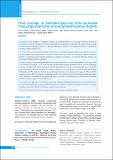Please use this identifier to cite or link to this item:
https://hdl.handle.net/20.500.14356/1030| Title: | Fecal Carriage of Extended-Spectrum beta-Lactamase Producing Escherichia coli among Health Science Students |
| Authors: | Sharma, Birat Yadav, Santosh Khanal, Avaya Shakya, Basu Shrestha, Kamal Aryal, Shiva Kattel, Hari Parajuli, Keshab Mishra, Shyam Kumar |
| Citation: | SharmaB., YadavS., KhanalA., ShakyaB., ShresthaK., AryalS., KattelH., ParajuliK., & MishraS. K. (2022). Fecal Carriage of Extended-Spectrum beta-Lactamase Producing Escherichia coli among Health Science Students. Journal of Nepal Health Research Council, 20(01), 160-165. https://doi.org/10.33314/jnhrc.v20i01.3872 |
| Issue Date: | 2022 |
| Publisher: | Nepal Health Research Council |
| Article Type: | Original Article |
| Keywords: | Escherichia coli fecal carriage health science students multidrug-resistant |
| Series/Report no.: | Jan-March, 2022;3872 |
| Abstract: | Abstract Background: The incidence of antibiotic resistance in commensal bacteria is increasing with the production of extended-spectrum beta-lactamase. Therefore, this study was conducted to understand the status of fecal carriage of such enzyme producing Escherichia coli among health science students of seven different faculties of Institute of Medicine, Tribhuvan University. Methods: This was a cross-sectional study conducted over six months among the health science students. One stool sample collected from each student was cultured and Escherichia coli isolates were identified, antibiotic sensitivity profile was produced, and extended-spectrum beta-lactamase production was detected following Clinical and Laboratory Standards Institute guidelines. Results: A total of 156 students participated in the study, and Escherichia coli was isolated from all. Out of the total 156 Escherichia coli isolates, 11.5% were extended-spectrum beta-lactamase-producers and 14.7% were multidrug-resistant. The highest rate of fecal carriage of extended-spectrum beta-lactamase-producing Escherichia coli was found among Bachelor of Medicine and Bachelor of Surgery students (17.5%) and Bachelor of Science in Medical Imaging Technology (16.7%) students. Such enzyme producing Escherichia coli was found in the range of 6.9% to 25.0% among second- to fifth-year students. A significant number of extended-spectrum beta-lactamase-producing isolates were resistant to ciprofloxacin and gentamicin, apart from other extended-spectrum beta-lactamase substrate antibiotics, when compared with non-producers. Conclusions: A high rate of extended-spectrum beta-lactamase-producing Escherichia coli was detected from the gut of healthy health science students which indicates their possible dissemination throughout the wider community resulting in potential outbreak of infections caused by such organisms. Keywords: Escherichia coli; fecal carriage; health science students; multidrug-resistant. |
| Description: | Original Article |
| URI: | http://103.69.126.140:8080/handle/20.500.14356/1030 |
| ISSN: | Print ISSN: 1727-5482; Online ISSN: 1999-6217 |
| Appears in Collections: | Vol. 20 No. 01 (2022): Issue 54 Jan-March, 2022 |
Files in This Item:
| File | Description | Size | Format | |
|---|---|---|---|---|
| 3872-Manuscript-27885-1-10-20220606.pdf | Fulltext Download | 284.45 kB | Adobe PDF |  View/Open |
Items in DSpace are protected by copyright, with all rights reserved, unless otherwise indicated.
